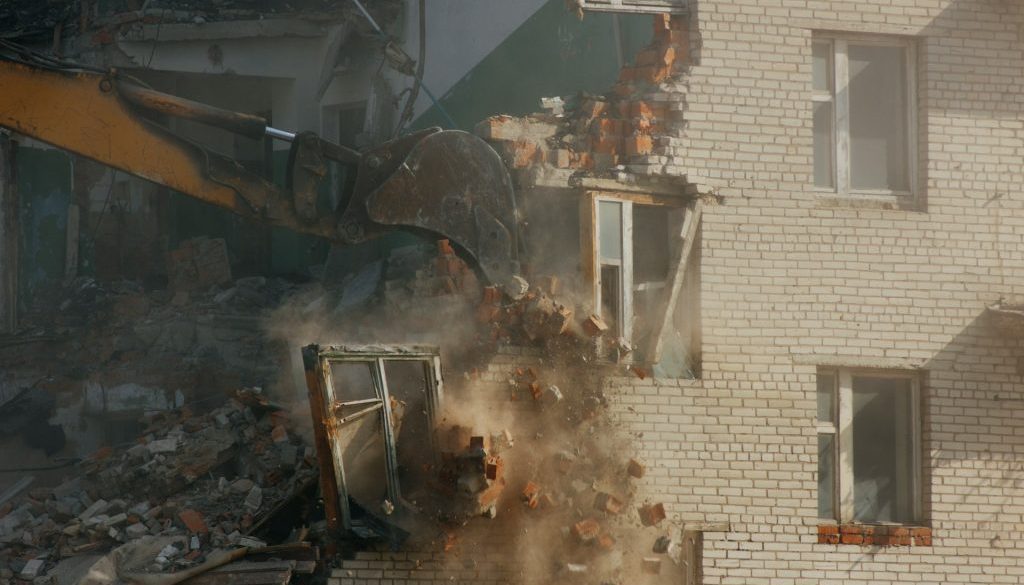Demolition projects, whether of small-scale residential properties or large commercial buildings, create significant amounts of waste materials. Managing demolition waste responsibly is crucial for ensuring project safety, environmental sustainability, and compliance with local regulations. Enviro Skip Hire, a family-run skip hire and aggregate company servicing Staffordshire, is committed to providing efficient waste management solutions tailored specifically to the unique challenges of demolition projects, ensuring a streamlined and eco-conscious approach to waste disposal.
In this comprehensive guide, we will discuss the essentials of demolition waste management, including waste identification, disposal and recycling methods, and the benefits of collaborating with a reliable waste management service provider like Enviro Skip Hire. Our aim is to provide demolition professionals and property owners undertaking demolition projects with the knowledge and tools needed to manage waste responsibly, contributing to a cleaner environment and efficient project execution.
1. Identifying Demolition Waste Materials
Understanding the various types of waste generated during demolition projects is vital for effective management. Typical demolition waste materials include:
– Concrete and Brick: These materials can be crushed and recycled for use as aggregate or backfill in construction projects.
– Wood and Timber: Wooden waste, such as beams and flooring, can often be recycled or repurposed for use in new construction or furniture.
– Metals: Structural steel, copper wiring, and other metals can be salvaged and recycled, contributing to cost savings and resource conservation.
– Plasterboard: Gypsum plasterboard can be processed into a powder for use as a soil conditioner or in new plasterboard products.
– Non-recyclable Materials: Some waste materials, such as asbestos or contaminated soil, require specialised disposal methods to ensure safety and environmental protection.
2. Strategies for Effective Demolition Waste Management
Adopt these strategies to ensure efficient demolition waste management:
– Waste Audit: Assess the potential waste materials and quantities before commencing demolition to develop a tailored waste management plan and select appropriate skips for waste storage.
– Reuse and Repurpose: Whenever possible, salvage materials for reuse in future projects or donate items to local salvage yards, reducing the volume of waste sent to landfill.
– Recycling: Implement recycling practices for applicable waste materials, such as crushing concrete or separating metals, to promote resource conservation and reduce disposal costs.
– Hazardous Waste Disposal: Handle any hazardous waste materials, such as asbestos or lead paint, according to local regulations and guidelines to ensure safety and environmental compliance.
3. The Benefits of Partnering with Enviro Skip Hire for Demolition Waste Management
Collaborating with Enviro Skip Hire offers numerous advantages for efficient demolition waste management:
– Variety of Skip Sizes: Our wide range of skips can accommodate diverse demolition waste requirements, ensuring appropriate storage and disposal solutions for every project.
– Expert Advice: Our team of waste management professionals can provide guidance on best practices for managing demolition waste and help you develop a tailored waste management strategy for your project.
– Timely Rubbish Removal: Our prompt and professional waste removal services maintain a safe and organised worksite throughout the demolition process.
– Commitment to Sustainability: We emphasise eco-friendly waste management, recycling as much demolition waste as possible to minimise environmental impact and adhere to responsible practices.
4. Tackling Common Demolition Waste Management Challenges
Demolition projects may face several challenges in handling waste materials. Here are some solutions to help address these issues:
– Space Constraints: For sites with limited space, consult with Enviro Skip Hire to determine the most appropriate waste storage solution and skip size. Regular rubbish removal can also help maintain safe and organised worksites despite space limitations.
– Environmental Regulations: Familiarise yourself with local demolition waste disposal regulations and adopt the necessary measures to ensure compliance. Enviro Skip Hire can offer guidance and resources to help you navigate these rules.
– Segregating Waste Materials: Train team members on waste segregation procedures and provide clear, labelled skips to promote responsible waste management and reduce cross-contamination.
Conclusion
Responsible demolition waste management is an essential component of any successful demolition project, contributing to a safer worksite, environmental sustainability, and adherence to local regulations. By implementing the strategies outlined in this guide and partnering with Enviro Skip Hire, demolition projects can achieve efficient waste management, leading to cleaner construction sites and reduced environmental impact.
At Enviro Skip Hire, we are dedicated to providing demolition projects with tailored waste management solutions that prioritise sustainability and efficient practices. Our extensive range of skips, expert knowledge, and commitment to responsible disposal make us the ideal partner for demolition projects of any scale. Trust Enviro Skip Hire for comprehensive waste management solutions that elevate your demolition project’s waste handling practices and contribute to a greener future for the construction industry. Contact us now for more information on our skip hire prices in Cheshire.




